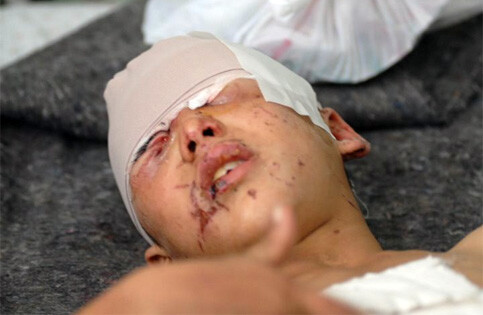Gaza Strip 20 January 2009

Eight-year-old Louay Sobeh, blinded by Israeli bombs. (Sameh A. Habeeb)
As a Gazan journalist who is devastated by the holocaust the Israel army is perpetrating against us, I find myself at loss. The list of horrendous crimes committed by the Israeli army against Palestinians is endless and the crimes are countless.
Should I write about the 45 evacuees who were massacred in their refuge at the United Nations-administered al-Fakhoura school? Should I write about the most horrifying crime when Red Cross personnel found four starving children who had spent four days with the dead bodies of their mothers and other relatives in the ruins of a house in the al-Zeitoun neighborhood?
Should I talk about the mass killing of the al-Dayaa family when 15 family members were killed when a “smart” bomb gently hit their five-story building?
What about the sadistic crime when the father of the al-Samuni family was executed before his wife and children? Or the carnage committed against the extended al-Samuni family when 29 members of the clan were concentrated in one house which was bombed and collapsed on top of them, killing them all?
These and so many other crimes have already been documented by Amnesty International and other human rights institutions. Many more are still untold stories. I can tell one story with my own words and my own camera — that of eight-year-old Louay Sobeh. Little Louay could not know what this war had in store for him or his family.
About a week ago Louay and his family fled their house in Beit Lahiya town in northern Gaza. They were under heavy Israeli artillery fire as the Israeli army invaded the area at the outset of Israeli ground military operation. Sorrowfully, Louay started to narrate what he witnessed:
“Israeli shells started to rain down beside my house in northern Gaza. Rockets started to get closer to my house and many people were killed. My house got some shrapnel and part of rockets. Then, my grandmother and my family fled to Jabaliya where we sheltered in one of the [Untied Nations] schools. We stayed for three days where it was very very cold. When we fled our house in the night we didn’t bring any luggage or clothes or food. My father, brother and other family members decided to go back to our house in the north to bring some clothes and food. We went early in the morning by car then all of a sudden people beside our car started to run left and right. I heard explosions and I felt as if I were flying in the sky. And I found myself in the hospital.”
The Israeli bombing of Louay’s father’s car killed one of his brothers and injured others. The shocking fact is that Louay still doesn’t know is that he lost his eyesight completely. He will never be able to see the light again! His grandmother was beside him trying to make him feel better. He still doesn’t know that his brother was killed.
Before I left his room Louay told me, “I hope you visit me again and you will go with me to take footage and photos of the place where the car was hit. I will also make a scene for you about how I flew. But I need you to help me recover quickly so I can go to school again and play with some of my friends. I don’t know if they are alive or not.”
I was shocked by his talent and affected by his words. It’s very brutal when a child like Louay becomes a victim for no reason. There must be a way for Louay and all the children of Palestine to have peace and rest, instead of the fire and hell they have witnessed.
Louay is one of the lucky ones: he is expected to be taken to Saudi Arabia to receive medical treatment sponsored by the Saudi king. For too many children such aid is too late and it still won’t bring the light back to Louay’s eyes.
Sameh A. Habeeb is a photojournalist, humanitarian and peace
activist based in Gaza, Palestine. He writes for several news websites on a freelance basis.
Related Links



